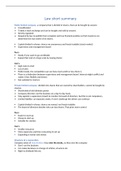Law short summary
Public limited company, a company that is divided in shares, that can be bought by anyone
Crowdfunded
Traded a stock exchange and can be bought and sold by anyone.
Strictly regulated
Required by law to publish their complete and true financial position so that investors can
determine the true worth of its shares.
Capital divided in shares: shares are anonymous and freely tradable (stock market)
Supervisory and management board
Pro’s
Handy if you want to go worldwide
Expand fast and at a large scale by issuing shares
Con’s
High costs to start
Lot of rules
Public books, the competition can see how much profit or loss there is
There is a distinction between supervisory and management board. Interest might conflict and
makes it less flexible and slower.
Not suitable for starters
Private limited company: divided into shares that are owned by shareholders, cannot be bought by
anyone.
Shareholders hold ultimate power
Company directors run the business on a day-to-day basis.
May appoint a supervisory board to monitor its board of directors, but this is not compulsory.
Limited liability: can separate assets, if one is bankrupt the others can continue
Capital divided in shares: shares are named, not freely tradable
The board of directors decides who can buy shares. That gives more control
Pro’s
Easier to start up
Cheap to start up
Suitable for starters
Con’s
Smaller resources
More expensive and time consuming to set up
Expanding is harder and slower.
Structure of a corporation
Company exists of shareholders: they own the stocks, so they own the company
Don’t run the business
Can make decisions on change of articles, structure etc
Right to dividend/info etc
, CEO is the managing director and the face of the company
Heart and soul of the company
Communicator between stakeholders
Executive/management board are the ones that run the business
Persons that are liable
Leaders of the company
Hands & feet of the company
Supervisory board are shareholders that keep an eye on the management and CEO
Eyes & ears
Board of directors are the supervisory and management board together
Chosen and appointed by general shareholders meaning
Corporate governance: set of relations between company’s management, board, shareholders,
stakeholders.
Provides structure
System of transparency, accountability and power balance
Monitoring the system
Operational forms
Management contract: a contract between a management company and an owner. The company
operates the company but the owner pays for it.
Advantage: Individual design, professional team, possibility
Disadvantage: loss of control, conflict of interest
Franchise: agreement between franchisee and franchisor. The franchisor grants its resources, brand
image etc. to the franchisee for a certain fee.
Franchisor
PRO: fast expansion possible, easy way to expand capital, control is in your own hands
CON: franchisees can damage the chain’s reputations, you will share the profit, you need a solid
profitable plan or product to attract franchisees.
Franchisee
PRO: solid business plan, more support, known brand name, less investment
CON: loss of freedom, franchise free, strict rules, not flexible, franchisor dominant
Referral group: independent companies which have grouped together for some common purpose.
Only working together on marketing level.
Own brand and style.
Share costs, reservation system, they refer each other and promote each other.
PRO: a network, shared marketing, an umbrella but prefers own identity, you have help
CON: costs money, more competitor under same brand, little bit less freedom: you have to
comply to marketing strategy that the referral organization offers.





